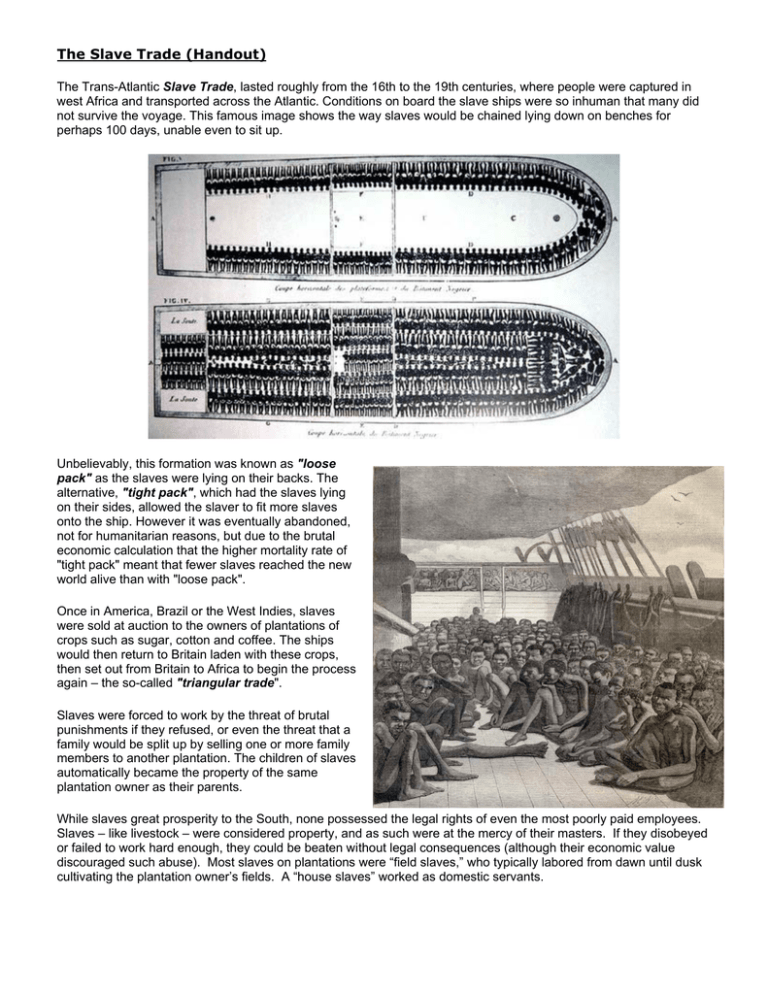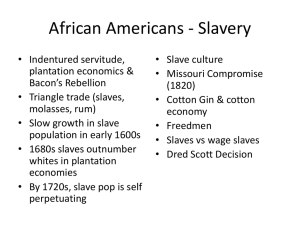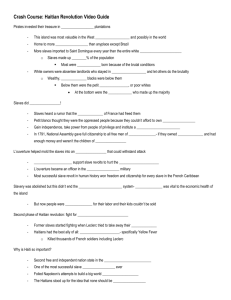The Slave Trade (Handout)
advertisement

The Slave Trade (Handout) The Trans-Atlantic Slave Trade, lasted roughly from the 16th to the 19th centuries, where people were captured in west Africa and transported across the Atlantic. Conditions on board the slave ships were so inhuman that many did not survive the voyage. This famous image shows the way slaves would be chained lying down on benches for perhaps 100 days, unable even to sit up. Unbelievably, this formation was known as "loose pack" as the slaves were lying on their backs. The alternative, "tight pack", which had the slaves lying on their sides, allowed the slaver to fit more slaves onto the ship. However it was eventually abandoned, not for humanitarian reasons, but due to the brutal economic calculation that the higher mortality rate of "tight pack" meant that fewer slaves reached the new world alive than with "loose pack". Once in America, Brazil or the West Indies, slaves were sold at auction to the owners of plantations of crops such as sugar, cotton and coffee. The ships would then return to Britain laden with these crops, then set out from Britain to Africa to begin the process again – the so-called "triangular trade". Slaves were forced to work by the threat of brutal punishments if they refused, or even the threat that a family would be split up by selling one or more family members to another plantation. The children of slaves automatically became the property of the same plantation owner as their parents. While slaves great prosperity to the South, none possessed the legal rights of even the most poorly paid employees. Slaves – like livestock – were considered property, and as such were at the mercy of their masters. If they disobeyed or failed to work hard enough, they could be beaten without legal consequences (although their economic value discouraged such abuse). Most slaves on plantations were “field slaves,” who typically labored from dawn until dusk cultivating the plantation owner’s fields. A “house slaves” worked as domestic servants. Recommended Hollywood Movies you should view to gain a better understanding of Slavery in America: Amistad (1997) Directed by Steven Speilberg starring Djimon Hounsou, Morgan Freeman, Matthew McConaughey Roots (1977) Directed by Marvin J. Chomsky starring Maya Angelou, Levar Burton, Ed Asner, O.J. Simpson The Colour Purple (1985) Directed by Steven Speilberg starring Danny Glover, Whoopi Goldberg, Oprah Winfrey Beloved (1998) Directed by Jonathon Demme starring Danny Glover, Oprah Winfrey, Thandie Newton After Viewing the Clips in Class and reading the eyewitness account of the Slave Auction, record some descriptive terms that would describe the experience of slaves. ____________________________________________________________________________________ ____________________________________________________________________________________ ____________________________________________________________________________________ ____________________________________________________________________________________ ____________________________________________________________________________________ ____________________________________________________________________________________ ____________________________________________________________________________________ ____________________________________________________________________________________ ____________________________________________________________________________________



